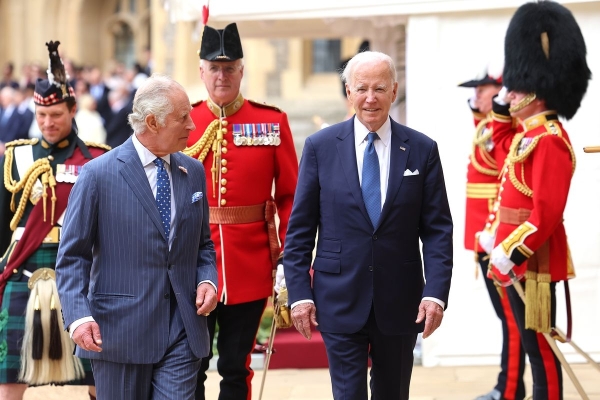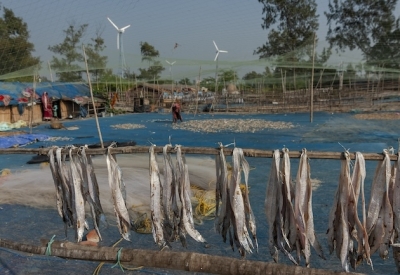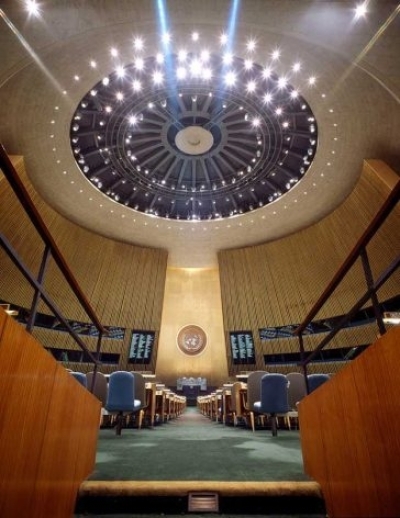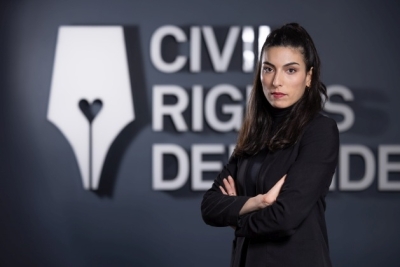President Joe Biden is in Europe this week for a series of pivotal meetings, including a NATO summit centered on long-term Ukraine policy in Vilnius, Lithuania. These meetings come at a critical time: They are meant to signal the US and NATO countries’ enduring support of Ukraine, and to rally a newly expanded NATO as it struggles to align on the best response to Russia’s ongoing military action.
Biden’s first stop was in the United Kingdom, where he met with Prime Minister Rishi Sunak — and King Charles for the first time since his coronation. That visit will be followed by the NATO Summit, and another meeting in Helsinki, Finland, with Nordic countries.
Members of the alliance have a lot to discuss: Questions about both Ukraine and Sweden’s ability to join NATO remain outstanding. And the US’s decision to send Ukraine cluster bombs, a weapon that’s been banned by a number of NATO members, is also set to be addressed. Notably, member countries are likely to use the summit to discuss what long-term funding and military aid for Ukraine could entail.
“The biggest critique of the US support for Ukraine is that it’s all very short-term,” says Max Bergmann, director of the Europe program at the Center for Strategic and International Studies. “What about in 2024, in 2025?”
Below is a look at what the US hopes to gain from these meetings, and where the country stands going into them.
Why Biden visited Rishi Sunak and King Charles in the UK
On Monday, Biden met with British Prime Minister Sunak, and described the relationship between the two countries as “rock solid.” This week’s meeting enables Biden to reaffirm ties with the UK and marks his sixth with Sunak overall, though his first at 10 Downing Street.
Reflecting on the enduring strength of our alliance, the leaders covered:
— UK Prime Minister (@10DowningStreet) July 10, 2023
Progress to bolster the economic partnership
✅ The development of safe AI
Continuing long-term support for Ukraine
Ensuring Sweden’s accession to @NATOhttps://t.co/C75c54mY8T
The meeting achieved multiple goals: In it, Biden emphasized “steadfast support for Ukraine” while addressing differences regarding new weapons the US plans to provide, talked through issues involved with NATO’s expansion, and reiterated the US and UK’s special relationship.
The meeting enabled both Biden and Sunak to offer a united front regarding their backing for Ukraine, though they’ve previously differed on how explicit to be about the country’s ability to join NATO. While both agree Ukraine shouldn’t join until its war with Russia is over, the UK has appeared more supportive of Ukraine’s efforts to do so, while the US has been more cautious, due to the risk of opening up direct military conflict with Russia.
“The UK has been at the vanguard of supporting Ukraine,” says Garret Martin, a codirector of the Transatlantic Policy Institute at American University. “On that issue, the UK has been a very important partner in pushing the needle and even influencing the US to escalate.” In a recent CNN interview, Biden indicated that he favored providing a path for Ukraine and addressing additional conditions, rather than bringing the country into the group in the short term.
“I don’t think there is unanimity in NATO about whether or not to bring Ukraine into the NATO family now, at this moment, in the middle of a war,” he said. Sunak has said that Ukraine’s “rightful place” is in NATO.
The leaders also talked about the US’s recent and controversial delivery of cluster bombs to Ukraine. The UK and over 120 other countries have signed a convention that blocks the use of such weapons because of the threat they pose to civilians. The weapons are known to have unintended effects: Unexploded bombs can explode years later when triggered accidentally, hurting or killing civilians.
Biden and Sunak “discussed the commitments that UK has under that convention, both not to produce or use cluster munitions and to discourage their use,” a spokesperson for the prime minister said, according to Sky News. Sunak said he did what he could to convey the UK’s position on the weapons; they will be transferred to Ukraine as scheduled.
Sweden’s NATO membership was also on the agenda. As Vox’s Jen Kirby has explained, Russia’s invasion of Ukraine prompted Finland and Sweden to request NATO membership. Turkey previously opposed both the bids of Finland and Sweden because of “what [President Recep Tayyip Erdogan] saw as the countries’ support for Kurdish groups that he regards as terrorist organizations, and because of the countries’ arms embargoes on Turkey,” Kirby writes.
Although Turkey has resolved its objections with Finland, which has joined as the 31st NATO country, it continues to oppose Sweden’s accession. Monday, Biden and Sunak promised to keep working to get Sweden into the alliance.
Beyond NATO, the two leaders also addressed further action on the Atlantic Declaration, an agreement made in June aimed at increasing cooperation over tech manufacturing, AI and clean energy. After his confab with Sunak, Biden also met with King Charles for the first time, focusing heavily on their mutual interest in efforts to combat climate change. The two spoke with representatives from the private sector to discuss how companies could make investments that help address the issue.
What Biden wants from the NATO Summit in Vilnius, Lithuania
The NATO Summit on Tuesday and Wednesday is a major part of Biden’s trip, during which he’ll engage with leaders from the alliance’s 31 member countries. The goal here is to get all of NATO to agree on a plan for supporting Ukraine, and to try to get everyone on the same page about expanding the alliance.
Ukraine will likely receive a message about its potential inclusion in the bloc rather than an outright decision of whether it’s able to join. Ukrainian President Volodymyr Zelenskyy has previously pushed for an explicit signal regarding Ukraine’s invitation into the group. Those in favor of offering Ukraine a clearer path to joining NATO, including a number of European countries, have said that doing so would bolster its security and defenses. Those who are warier of doing so at this time, including the US and Germany, have worried, however, about risking an explicit military confrontation with Russia.
“I think there is more openness of Ukraine joining but there’s crucial differences in how quickly and how clear that guarantee should be,” says Martin.
NATO’s countries are also slated to discuss what a longer-term response to Ukraine could look like, whether that’s a more enduring commitment to military aid or financial support. Up until now, countries have provided Ukraine with enough money and weapons to last a few months. A longer-term plan would signal how committed they are to defending Ukraine, as well as enable the country to make more in-depth strategic plans.
“The most important component is that member states commit to weapon deliveries to Ukraine over a longer period of time,” says Council on Foreign Relations fellow Liana Fix. “The idea is to make this long-term and more formalized. It could be something like three to five years, not just in the next three to five months.”
Sweden’s accession to NATO is another significant issue on the table. Turkey faces notable pressure from other member countries, including the US, to drop its issues with the Nordic nation. More recently, Turkey has suggested it may be willing to do so if it is granted membership in the European Union, something that is unlikely to happen, and allowed to purchase F-16 fighter jets from the US, something Biden has signaled support for.
The conflict over Sweden’s inclusion points to divides within the group, and will be vital to curb in order to maintain the unity of the alliance. “If Turkey doesn’t shift, there’s potential for a real rift in the alliance,” says Bergmann.
Why the US is holding a Helsinki meeting with Nordic countries
After the NATO Summit, Biden heads to Helsinki and will be there on Thursday. His visit is meant to commemorate Finland’s inclusion in NATO, and also to send a message to Putin that the US is ready to come to Finland’s aid should Russia violate the border the countries share.
That summit will include gatherings with leaders from multiple Nordic countries including Norway, Sweden, Finland, Iceland, and Denmark. Given that Finland’s now in NATO, the country is likely to see increased support from member countries when it comes to shoring up its defense along its Russian border.
Other issues like access to resources in the Arctic, where Russia and China have established themselves, are poised to be on the table as well. “The Arctic is likely going to become an even bigger element of economic and security competition in the years to come,” says Martin.






